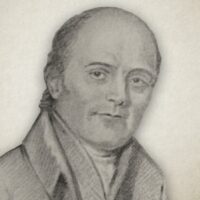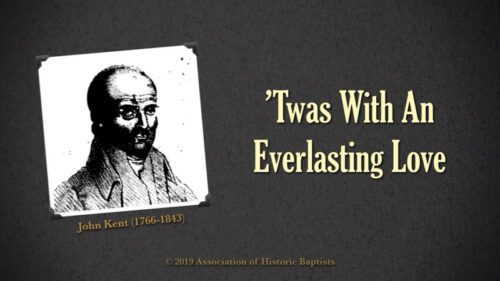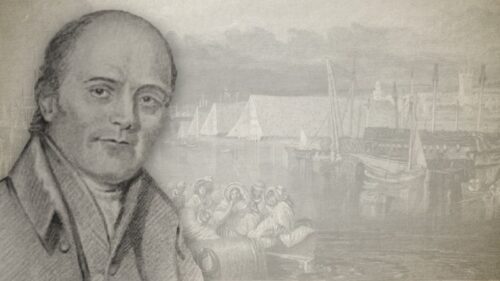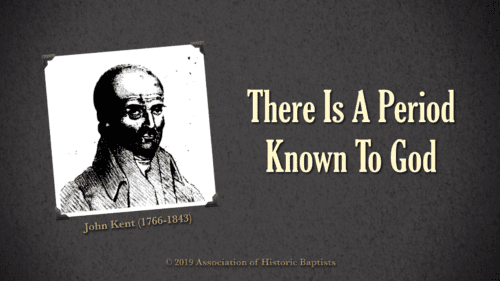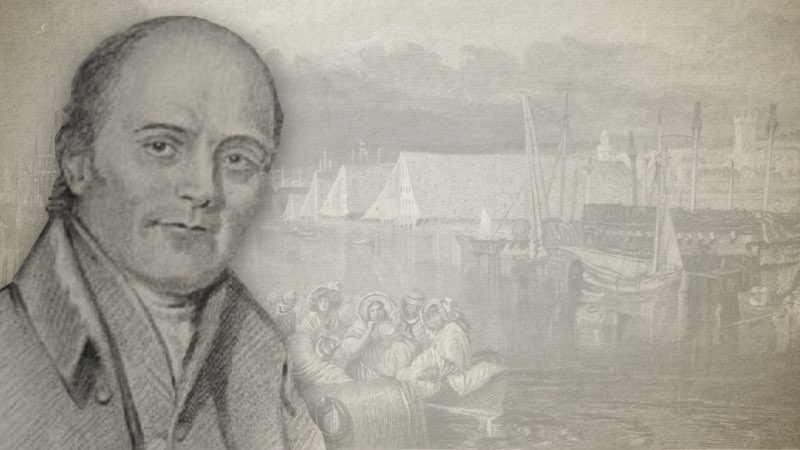
The Life And Testimony Of John Kent
John Gadsby:
John Kent was born in the town of Bideford, Devonshire, December, 1766. His parents were amongst the poor of this world, yet “rich in faith.” They had a numerous family, for whose support they labored hard yet their chief concern, their earnest prayer was, that their souls might be fed with “that bread which endureth unto everlasting life,” that so they might become manifestively those whom “God had chosen to salvation, through sanctification of the Spirit, and belief of the truth;” and they lived to bless God for gracious answers to these supplications, four of their children having been early called to know the Lord, amongst whom was John, the youngest, author of “Gospel Hymns.” At the age of 14, he was apprenticed to his father, then a shipwright in the yard at Plymouth Dock (now Devonport). Not having had the advantages of education in early life, and having a thirst for knowledge, he employed the leisure hours of this period in making up for that deficiency, and in cultivating the poetic talent which he possessed. This brought him into public notice, though it was not until 1803 that be published the first edition of his Hymn Book. The great mysteries of redemption through the infinite merits and atoning sacrifice of the Lord Jesus Christ was a theme on which he delighted to dwell, which indeed many of his hymns abundantly prove. He possessed much energy of mind and firmness of principle, with peculiar keenness in detecting error, stripping it of the false and deceptive garb in which he found it, and showing it up in all its nakedness and deformity. As a companion, he was cheerful and interesting; his conversation evidenced much spirituality of mind. Salvation by grace alone was a subject on which he loved to dwell when in the bosom of his family; and as he spoke of the manifestation of that grace and mercy towards himself, his thoughts would seem too full for utterance, and tears often told the feelings of his soul. In singing the praises of redeeming love he felt much delight, often speaking of sweet fore-tastes of heaven enjoyed at such seasons. Before he had attained the age of 60 years he was afflicted with blindness. Though this was indeed a heavy stroke, yet it was borne by him with great patience, for he was made to feel that it was laid on him by a wise and tender Father. He was now obliged to lay aside his book and pen. Still his mind was vigorous and active, and many of his hymns were written after this, his little grandson having become his amanuensis. About this time he was severely tried by several family bereavements; yet the Lord mercifully sustained him, and seemed to be preparing him for his own removal. At the close of the year 1843, he was laid low by a disorder of a peculiarly painful and distressing nature, from which he had often suffered, but which now threatened speedy dissolution. For several days he had to endure the most intense agony. Now indeed the time was come when he was to prove the strength of that arm on which he had been leaning through his long pilgrimage; nor did it fail! He could say then, with one of old, “Though I walk through the valley of the shadow of death, I will fear no evil, for thou art with me.” The following are some of the expressions which fell from his lips during the last few days of his earthly existence: “My hopes are fixed on the Rock of Ages.” The 27th Psalm having been read to him, he raised his trembling hand, and said, with much feeling, “I can put my hand upon the whole of that.” “I am in the arms of everlasting love.” “We must all appear before the judgment-seat of Christ.” That portion has cut me to the heart, while at the same time it has been my hope. If I am to stand by myself to give an account, I am lost, lost for ever; but it is the judgment-seat of Christ; and he is my Surety, and has paid all demands. I shall be tried there by a covenant of grace, not a covenant of works; blessed be God for his great salvation.” “I bless God that the promises of the gospel met me in all my wants, wounds, and wretchedness.” “I wish to die with God be merciful to me a sinner’ upon my lips.” The great enemy of souls was now permitted to make a last attack upon him, when he said to his son, “Satan has again thrust sore at me, but I shall triumph. He would have me give up my hope, and believe the gospel to be a cunningly-devised fable; but Jesus was tempted; and knows how to succor them that are tempted. This I have experienced. He has been my defense.” “It is indeed a consoling thought that most probably a few short hours will terminate my sufferings.” “The war with Amalek will soon be over.” His fightings and fears appeared to be past. He extended his hand, cold with the chill of death, and exclaimed, “I rejoice in hope I am accepted—accepted!” He then, like the patriarch Jacob, gathered up his feet in the bed, and fell asleep in Jesus, on the 15th of November, 1843, aged 77.
John Kent (1766-1743) was an English hymn writer. Having been apprenticed to his father, he became a ship-builder. Residing in Plymouth, near the dockyard, they were members of the Barrack-Street Baptist church. It was for this congregation Kent’s hymns were compiled and published. Fifty-one of his hymns are included in William Gadsby’s Selection of Hymns, which is not surprising since Kent was an ardent believer in high views of sovereign grace.



